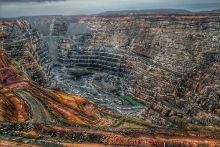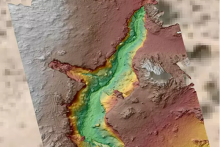This webinar is part of the Earth Science Week 2021 webinar series.
Cave research represents the essence of Earth science since it involves going into and directly studying the Earth itself. Caves, and the karst areas in which most form, are highly valuable yet vulnerable features. They provide water to about 700 million people but are the most easily contaminated of groundwater supplies. Additionally, they can collapse to create sinkholes, swallowing roads and buildings, causing hundreds of millions of dollars in damages annually in the US alone. Join this presentation, which is part of the celebration of the International Year of Caves and Karst, to explore caves and karst around the world and the many aspects of the Earth sciences they include.
About the speaker
Dr. George Veni is the Executive Director of the National Cave and Karst Research Institute (NCKRI) and an internationally recognized hydrogeologist specializing in caves and karst terrains. Prior to NCKRI, he owned and served as principal investigator of George Veni and Associates, conducting multidisciplinary environmental karst management studies for more than 20 years. He has conducted karst research throughout the United States and in several other countries. He has chaired 16 international and multidisciplinary karst conferences, been a member of the governing board of the International Union of Speleology since 2002, serving as President since 2017 and organizing the International Year of Caves and Karst in 2021. He has served as a doctoral committee advisor for geological, geographical, and biological dissertations at the New Mexico Institute of Mining and Technology, The University of Texas at Austin, The University of Texas at San Antonio, and Aristotle University of Thessaloniki and Harokopio University in Greece, taught karst geoscience courses as an adjunct professor for Western Kentucky University for 12 years, and taught karst science and management workshops internationally for NCKRI since 2011. Three cave-dwelling species have been named in his honor. He has published and presented nearly 270 papers, including six books, on hydrogeology, biology, and environmental management in karst terrains.






